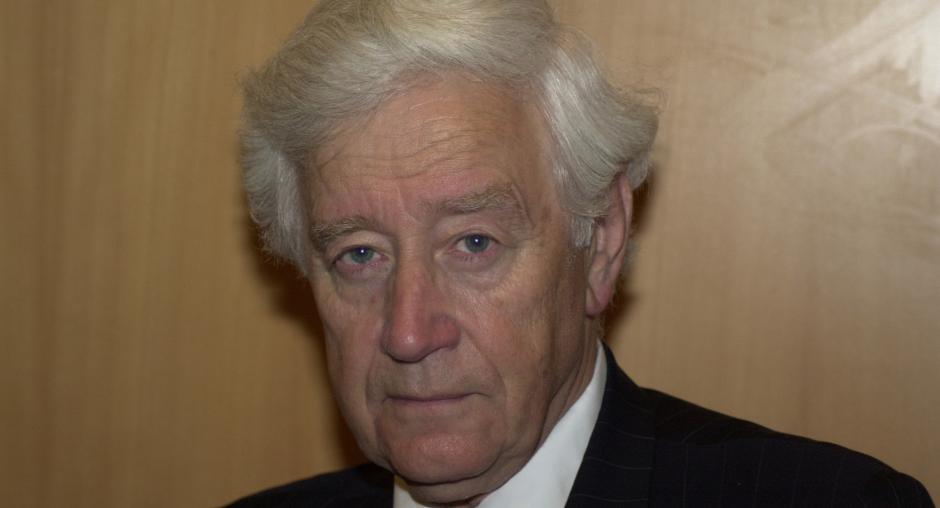Newsroom
High Commissioner on National Minorities on Moldova: "Resolving Ethnic Issues not a Zero Sum Game"
CHISINAU 10 April 2002

Rolf Ekeus, the OSCE High Commissioner on National Minorities, recently ended a visit to Moldova. (Michal Olejarnik/OSCE) Photo details
CHISINAU, 10 April 2002 - During his three day visit to the Republic of Moldova, the OSCE High Commissioner on National Minorities, Rolf Ekeus, stressed to interlocutors from across the political and ethnic spectrum that "resolving ethnic issues is not a zero sum game".
The High Commissioner met senior officials, including President Vladimir Voronin, leading members of Parliament from the Communist and Christian Democratic Popular parties, as well as minority representatives.
In discussions on issues including language, education and political participation, Mr. Ekeus noted that "measures designed to protect and promote the identity of one ethnic group should not be a threat to others". For example, on language issues, he noted the importance of all citizens learning the State language yet observed that this does not diminish the opportunity to use minority languages. The High Commissioner pledged further support for projects designed to improve the knowledge of the State language among non-native speakers.
Commenting on the current turbulent political climate, including the situation in Gagauz-Yeri, the OSCE High Commissioner stressed the need for constructive dialogue and appealed to all parties to respect the rule of law and to follow democratic procedures.
"Moldova is a young country and faces many challenges", said Mr. Ekeus. "Its multi-ethnicity should be considered as an asset rather than as a potential source of conflict or a hindrance to progress". He emphasized the importance of integration in order to promote social and inter-ethnic harmony.
The High Commissioner warned against extremism and called on all those with an interest in Moldova's stability and integrity to seek a pragmatic and peaceful solution to the current impasse.
The High Commissioner expressed his concern for the plight of a number of schools in Transdniestria which face difficulties in teaching the State language in the Latin script. Mr. Ekeus expressed solidarity with the teachers and parents who face intimidation, praised the humanitarian work of the United Nations High Commissioner on Refugees (UNHCR) in supporting the schools, and called on the Transdniestrian authorities not to obstruct the work of the schools. "The rights and welfare of children should not become the victims of political agendas", said Mr. Ekeus. "There must be practical solutions to immediate and solvable problems to prevent a worsening of the situation", he warned.
The High Commissioner met senior officials, including President Vladimir Voronin, leading members of Parliament from the Communist and Christian Democratic Popular parties, as well as minority representatives.
In discussions on issues including language, education and political participation, Mr. Ekeus noted that "measures designed to protect and promote the identity of one ethnic group should not be a threat to others". For example, on language issues, he noted the importance of all citizens learning the State language yet observed that this does not diminish the opportunity to use minority languages. The High Commissioner pledged further support for projects designed to improve the knowledge of the State language among non-native speakers.
Commenting on the current turbulent political climate, including the situation in Gagauz-Yeri, the OSCE High Commissioner stressed the need for constructive dialogue and appealed to all parties to respect the rule of law and to follow democratic procedures.
"Moldova is a young country and faces many challenges", said Mr. Ekeus. "Its multi-ethnicity should be considered as an asset rather than as a potential source of conflict or a hindrance to progress". He emphasized the importance of integration in order to promote social and inter-ethnic harmony.
The High Commissioner warned against extremism and called on all those with an interest in Moldova's stability and integrity to seek a pragmatic and peaceful solution to the current impasse.
The High Commissioner expressed his concern for the plight of a number of schools in Transdniestria which face difficulties in teaching the State language in the Latin script. Mr. Ekeus expressed solidarity with the teachers and parents who face intimidation, praised the humanitarian work of the United Nations High Commissioner on Refugees (UNHCR) in supporting the schools, and called on the Transdniestrian authorities not to obstruct the work of the schools. "The rights and welfare of children should not become the victims of political agendas", said Mr. Ekeus. "There must be practical solutions to immediate and solvable problems to prevent a worsening of the situation", he warned.
